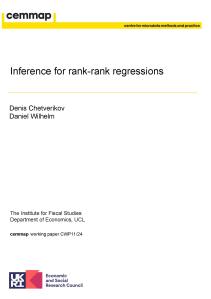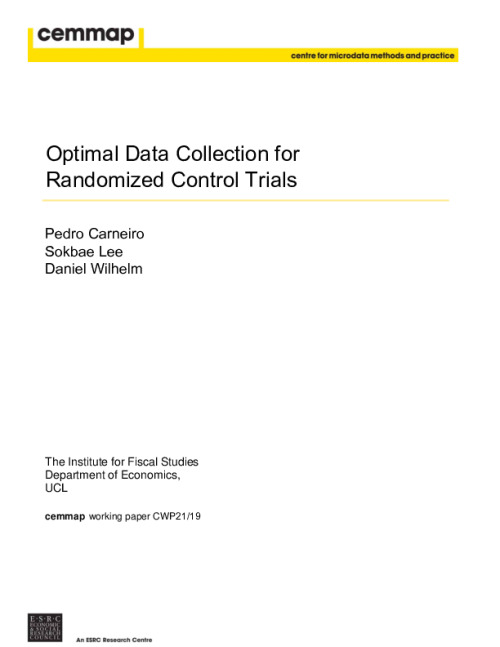Downloads
In a randomized control trial, the precision of an average treatment effect estimator and the power of the corresponding t-test can be improved either by collecting data on additional individuals, or by collecting additional covariates that predict the outcome variable. To design the experiment, a researcher needs to solve this tradeoff subject to her budget constraint. We show that this optimization problem is equivalent to optimally predicting outcomes by the covariates, which in turn can be solved using existing machine learning techniques using pre-experimental data such as other similar studies, a census, or a household survey. In two empirical applications, we show that our procedure can lead to reductions of up to 58% in the costs of data collection, or improvements of the same magnitude in the precision of the treatment effect estimator.
Authors

Research Fellow Columbia University
Sokbae is an IFS Research Fellow and a Professor at Columbia University, with an interest in Econometrics, Applied Microeconomics and Statistics.

Research Fellow University College London
Pedro is a Professor of Economics at University College London and an economist in the IFS' Centre for Microdata Methods and Practice (cemmap).

Research Associate LMU Munich
Daniel is a Research Associate of the IFS in Cemmap and Professor of Statistics and Econometrics at LMU Munich.
Working Paper details
- DOI
- 10.1920/wp.cem.2019.2119
- Publisher
- The IFS
Suggested citation
P, Carneiro and S, Lee and D, Wilhelm. (2019). Optimal Data Collection for Randomized Control Trials. London: The IFS. Available at: https://ifs.org.uk/publications/optimal-data-collection-randomized-control-trials-2 (accessed: 30 June 2024).
More from IFS
Understand this issue

Gender norms, violence and adolescent girls’ trajectories: Evidence from India
24 October 2022

What are the challenges in getting debt on a falling path?
28 June 2024

Election Special: Your questions answered
27 June 2024
Policy analysis

IFS Deputy Director Carl Emmerson appointed to the UK Statistics Authority Methodological Assurance Review Panel
14 April 2023

ABC of SV: Limited Information Likelihood Inference in Stochastic Volatility Jump-Diffusion Models
We develop novel methods for estimation and filtering of continuous-time models with stochastic volatility and jumps using so-called Approximate Bayesian Compu- tation which build likelihoods based on limited information.
12 August 2014

Is there really an NHS productivity crisis?
17 November 2023
Academic research

Inference for rank-rank regressions
28 May 2024

Sample composition and representativeness on Understanding Society
2 February 2024

The impact of labour demand shocks when occupational labour supplies are heterogeneous
28 June 2024
